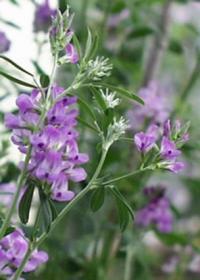Alfalfa Herb Alfalfa herb is a perennial herb orginating from the Middle East. Called the "father of all foods" is is rich in calcium, magnesium and potassium as well as the vitamins A,D,E and vitamin K. Vitamin K in particular can cause clotting. Alfalfa herb is a perennial herb orginating from the Middle East. Called the "father of all foods" is is rich in calcium, magnesium and potassium as well as the vitamins A,D,E and vitamin K. Vitamin K in particular can cause clotting. This herb also contains carotene, chlorophyll and eight essential amino acids. Early English and American herbalists used it to settle and upset stomach. Alfalfa Herb BenefitsThis herb is an immune system stimulant that promotes normal blood clotting. It has several conditions in which is used for specific health benefits:
Studies have shown that this herb may help reduce cholesterol and therefore treat atherosclerosis, however for all the other conditions listed above, more studies are needed. Teas are best for this herb. 5 grams steeped in water and taken 3 times a day, or tincture taken 3 times a day. CautionsAlfalfa is not recommended for primary treatment of health conditions. It can be taken in capsules, or raw sprouts that have been washed. Do not eat the seeds unsprouted as they contain a toxic amino acid, canavanine. Vitamin K deficiencies occur with many medications and alfalfa can help replace this. Pregnant women therefore should NOT take alfalfa due to the clotting effects. Also people with autoimmune disorders such as rheumatoid arthritis, thyroiditis, lupus or multiple sclerosis should not take alfalfa. This herb will counter effect Coumadin, Warfarin and Lovenox, so do not take it if on these blood thinning medications. Cancer patients: Since cancer can be a hypercoagulable (thick blood and clotting) type of condition, you should NOT take alfalfa unless cleared by your oncologist. Other Medication InteractionsEstrogens: This includes all forms of birthcontrol pills and estrogen taken for menopause symptoms. Again we are talking about coagulation and clotting. But the problem also exists in that alphafa can LOWER the blood levels of birth control pills, so you need to use back up prevention while on this herb.Birth control pills include ethinyl estradiol and levonorgestrel (Triphasil, Loestrol), ethinyl estradiol and norethindrone (Ortho-Novum 1/35, Ortho-Novum 7/7/7), and many generic pills. Taking alfalfa herb with estrogen for menopause may decrease it's effectiveness. You may start having more symptoms such as hot flashes and night sweats. Some of these drugs include azathioprine (Imuran), basiliximab (Simulect), cyclosporine (Neoral, Sandimmune), daclizumab (Zenapax), muromonab-CD3 (OKT3, Orthoclone OKT3), mycophenolate (CellCept), tacrolimus (FK506, Prograf), sirolimus (Rapamune), and all types of steroid. Photosensitivity medications include amitriptyline (Elavil), Ciprofloxacin (Cipro)and ANY drug with "floxin" in it's name, trimethoprim/sulfamethoxazole (Septra), tetracycline, methoxsalen (8-methoxypsoralen, 8-MOP, Oxsoralen), and Trioxsalen (Trisoralen). References: |
| ||
|
Information
Treatment
How To
Legal
| |||
|
| Home Page | Privacy Policy |Medical Disclaimer |Written by Mary Kay Betz |
Copyright©
2008-2012
| |||

